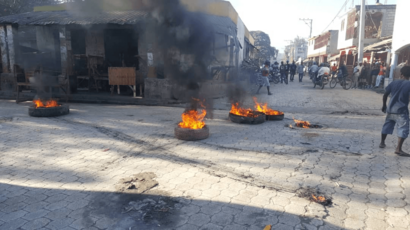Haitian crisis (2018–present) facts for kids
Quick facts for kids 2018–2024 Haitian crisis |
|||
|---|---|---|---|

Tires set on fire by protesters in Hinche, February 2019
|
|||
| Date | 7 July 2018 – present (7 years, 7 months, 2 weeks and 3 days) | ||
| Location | |||
| Caused by |
2021 phase
2022–2024 phase
|
||
| Goals | 2018–2021 phase
2022–2024 phase
|
||
| Resulted in |
|
||
| Parties to the civil conflict | |||
|
|||
| Lead figures | |||
|
|||
| Casualties | |||
| 5000+ dead, 2000+ injured, 2000+ kidnapped since 1 January 2023 360,000+ displaced as of 19 March 2024 |
|||
Since July 2018, people in Haiti have been protesting. These protests started because the cost of fuel went up. Over time, people also began asking for the president of Haiti, Jovenel Moïse, to step down.
Protesters, led by politician Jean-Charles Moïse, wanted a new temporary government. They also asked for better social programs and for officials who misused money to be held responsible. From 2019 to 2021, many large protests happened, calling for President Moïse to resign.
On July 7, 2021, President Jovenel Moïse was killed. A group of people were suspected in the attack. Some suspects were killed, and others were arrested. The search for others involved is still ongoing. On July 20, 2021, Ariel Henry became the acting prime minister.
In September 2022, more protests began because energy prices increased. Also, groups of gangs blocked Haiti's biggest fuel storage area. This, along with a serious illness outbreak and many people not having enough food, made the situation worse. The United Nations Security Council then put restrictions on Jimmy Chérizier, one of the gang leaders.
Some countries, like Canada, also put restrictions on certain business people and politicians. They were accused of being involved in serious human rights issues and having ties to gangs.
In March 2024, Prime Minister Henry was not able to return to Haiti after a trip. He had been trying to get help from Kenyan police to stop the gang violence. This situation caused more chaos. On March 11, Henry announced he would resign. This decision came after pressure from protesters, gangs, and other countries. He said he would step down once a new prime minister and government were chosen.
Helping Haiti: International Support
Many countries are trying to help Haiti. The United States has promised money to support an international police force. This force was approved by the UN. The U.S. also pledged money for humanitarian aid, which helps people in need.
Canada has also announced money to help Haiti. This includes funds for the international mission. As of March 2024, some money had been officially promised, but only a smaller amount had actually been given by Canada and France.
The U.S. military began flying cargo planes into Haiti's main airport in April. By mid-May, they had brought in a lot of supplies. These supplies included equipment for the Haitian police, medical gear, and food.
On June 26, 2024, the first group of police officers from Kenya arrived in Haiti. This arrival happened after several delays. These officers are there to help bring more safety and order to the country.
Images for kids
-
U.S. Ambassador to the UN Kelly Craft and President Jovenel Moïse met in November 2019 to discuss ways to solve Haiti's political problems.
See also
 In Spanish: Crisis en Haití (2019-presente) para niños
In Spanish: Crisis en Haití (2019-presente) para niños
 | Victor J. Glover |
 | Yvonne Cagle |
 | Jeanette Epps |
 | Bernard A. Harris Jr. |


